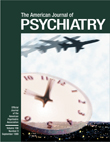Prediction of Reinforcing Responses to Psychostimulants in Humans by Brain Dopamine D2 Receptor Levels
Abstract
OBJECTIVE: This study assessed whether brain dopamine D2 receptor levels, which show significant intersubject variability, predict reinforcing responses to psychostimulants in humans. METHOD: [11C]Raclopride and positron emission tomography were used to measure D2 receptor levels in 23 healthy men (mean age=34 years, SD=7) who had no drug abuse histories in order to assess if there were differences between the subjects who liked and those who disliked the effects of intravenous methylphenidate (0.5 mg/kg). RESULTS: Subjects who liked the effects of methylphenidate had significantly lower D2 receptor levels (mean=2.72 Bmax/Kd, SD=0.3) than subjects who disliked its effects (mean=3.16, SD=0.3). Moreover, the higher the D2 levels found, the more intense were methylphenidate’s unpleasant effects. CONCLUSIONS: These results provide preliminary evidence that D2 receptor levels predict response to psychostimulants in humans and that low D2 receptors may contribute to psychostimulant abuse by favoring pleasant response.



